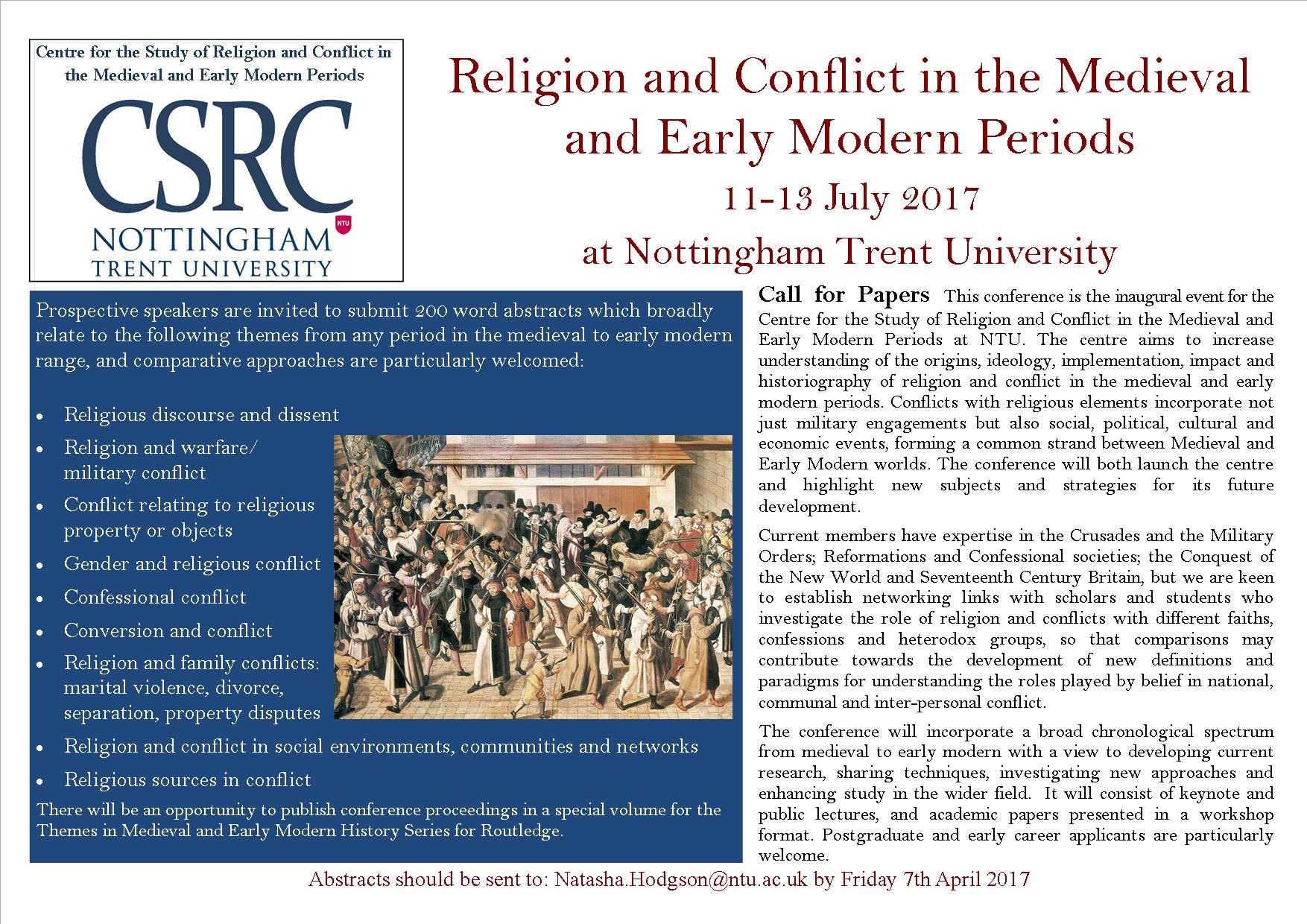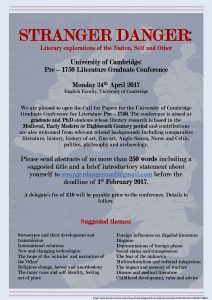
Author Archives: admin
CFP: Bodies in Motion in the Early Modern World (31/3/17)

Conference: Manuscript after Print (6th-7th April)
International Conference
Austrian Academy of Sciences
Vienna, 6th–7th April 2017
Thirteen international speakers will analyse the simultaneity of the handwritten and printed media in post-medieval Iceland, Ireland and Great Britain. The aim of the conference is to analyse post-medieval manuscript culture systematically, to bring specialists from different fields who work on similar subject together, and to open up ways for future collaborations.
Johannes Gutenberg’s invention of the printing press in or around 1450 brought about radical changes in communicative media. Printing proved to be extraordinarily influential, and within a few decades the printing press and printed books were to be found in all major European cities. Several studies emphasise this revolutionary aspects of Gutenberg‘s invention the printing press and label it as the key element of the transition from the Middle Ages to modern times: the printed word enabled, changed, enlarged and disseminated knowledge to a public audience for the first time in Europe. Thus, print enabled speedy and effective communication of new ideas of the Renaissance, the Reformation and advances in science.
Recent studies, however, prefer to portray the media change as a slow and developmental process: rather like an evolution than a revolution. Manuscript production did not cease after the invention of the printing press and contemporaries conceived no difference of media between books and manuscripts. In Iceland manuscript production increased considerably in post-medieval times. From the c. 20,000 extant Icelandic manuscripts world-wide, only c. 750 were written before the Reformation. In Ireland, where the manuscript tradition bears striking similarities to that of Iceland, around 80% of extant manuscripts were written in the 1650-1850 period.
It was not just the invention of the printing press that led to changes, though. Several factors played an important role in the development of the written word, such as the introduction of paper to the Western world and rising standards of education and literacy.
In this conference we will analyse three factors that were significant for the specific developments of print and manuscript culture: media, material aspects, and gender and social norms. Regarding media, speakers will analyse how oral, written and visual elements define the specific textuality of books and manuscripts, and what influence print had on post-medieval manuscripts. Concerning material, the introduction of paper to the Irish scribal market will be analysed. The third factor, social norms and gender, will focus on the possibilities of publication with regard to gender and literary genres, the implications of the chosen medium, and what types of texts were selected from print culture to reproduce in handwriting.
Programme
Poster
CFP ‘Storytelling’ (31st March)
This year, the theme of the Centre for Medieval Studies’ Graduate Conference is ‘Storytelling‘. Storytelling is a fundamentally human activity that bridges the past and present, the local and the international. Stories can be told through many mediums: art,
stained glass, buildings, manuscripts and oral accounts can all transmit stories,
whether they were intended to or not.
This is an interdisciplinary conference and we encourage papers from all disciplines including History, Literature, Art History, Archaeology, Classics, Philosophy and Paleography. Papers may consider, but are not limited to, the following topics:
- Writing the past: history in the medieval period
- Concepts of truth and fiction
- Memory and interpretation: competing stories (medieval and methodological)
- Metatexts: annotation, illustration and compilation
- Re-telling stories: transmission, translation, and changing perspectives
- The interaction between orality and literacy
- Spatial storytelling: the experience of stories through architecture
The deadline for submissions is 31st March 2017. Please submit abstracts of no more than 300 words along with a short biographical note to cms-grad-conf@york.ac.uk
Conference: The Study of the Bible in the Middle Ages, Saturday 18th February
The Study of the Bible in the Middle Ages: Where are we now?
The Study of the Bible in the Middle Ages is a conference aimed at bringing together academics at all stages of their careers to discuss the legacy of Beryl Smalley and her influence across the disciplines of medieval history, theology and politics.
Conference programme: https://studyofthebible.wordpress.com/conference-programme/
Registration: https://www.eventbrite.com/e/the-study-of-the-bible-in-the-middle-ages-tickets-30050471770
CFP: The EMREM Postgraduate Forum, ‘Images of Research’ (1st March)
CALL FOR PAPERS and IMAGES OF RESEARCH
The EMREM Postgraduate Forum
Annual Symposium and
Images of Research Exhibition
Thursday 18th and Friday 19th May 2017
Papers and images of research are invited for the 2017 EMREM two-day interdisciplinary symposium, to be held at the University of Birmingham. The theme for this year’s event is ‘Powerful Objects’.
Postgraduates from all fields of EMREM (History, Archaeology, Literature, Linguistics, Music, Art History) are welcome to share their research by giving papers and/or entering the exhibition, while also building networks at this friendly and well-established symposium. You may submit both a paper and an image.
Possible topics for papers and images might include, but are not limited to:
Materiality and Embodiment The Sacred and the Numinous
Text as Object Relics and Reliquaries
Life Courses and Biographies Digital Humanities
Object-Oriented Ontologies Royal Regalia
Human and Non-Human Objects Mechanical and Musical Instruments
Painting and Sculpture Weaponry and Armour
Tombs and Monuments Coins and Coinage
Papers should be 20 minutes in length. Please send proposals of approximately 300 words, OR 1000 words if applying as a panel, to emremforum@googlemail.com by 1st March 2017.
For the exhibition send a high resolution image along with a 200 word summary of what it shows and how it links to your research (if accepted, we will organise the printing). These will be exhibited during the conference, and prizes awarded.
emremforum.wordpress.com facebook.com/emremforum @EMREM_Forum
CFP: ‘Beyond Between Men’ (Monday 27th February)
Beyond Between Men: Homosociality Across Time
University of Oxford, Monday 19 June 2017
Since the publication of Eve Sedgwick’s groundbreaking 1985 work Between Men: English Literature and Male Homosocial Desire, ‘homosociality’ has become a regularly-used shorthand term for social bonds between persons of the same gender, and for the hegemonic norms that result from those social bonds. Despite this, academic discourse on homosociality in its historic context is surprisingly underdeveloped. Homosocial relationships and spaces do not just naturally manifest: they must be introduced, maintained, and developed in a variety of social contexts. That it is often assumed that homosociality simply ‘happens’ is a result of the internalisation of the cultural discourse that makes gender solidarity – in its most basic form, needing ‘girl time’ or ‘guy time’ – seem obvious and natural, when in fact promoting and maintaining (and in rarer contexts, deliberately dismantling) homosocial relationships and spaces requires sustained work on individual and collective levels. This one day symposium aims to bring together scholars of all periods of history and from different disciplines to discuss what homosociality means and what its study contributes to our understanding of the past.
Our plenary speaker is Dr David Clark, Associate Professor at the University of Leicester and author of the influential Between Medieval Men: Male Friendship and Desire in Early Medieval English Literature (2009).
We are seeking abstracts of approximately 100 words for papers of no more than twenty minutes in length. Submissions are sought from academics across the humanities and with any period of specialism from antiquity to the modern day. We intend that a selection of the conference papers will be published as a collection at a later date, though submitting your abstract does not commit you to this further project.
This conference is organised with the support of the History Faculty at the University of Oxford, TORCH (The Oxford Research Centre in the Humanities), and the Leverhulme Trust. Please submit abstracts to, or make enquiries at, beyondbetweenmen@gmail.com. Closing date for submission of abstracts is Monday 27 February.
CFP: ‘Identity in the Middle Ages’ (10th Feb)
MEDIEVAL MIDLANDS POSTGRADUATE CONFERENCE : ‘IDENTITY IN THE MIDDLE AGES’
TRINITY HOUSE CHAPEL, DE MONTFORT UNIVERSITY
THURSDAY 27TH AND FRIDAY 28TH APRIL 2017
Medieval Midlands (supported by the AHRC’s Midlands 3 Cities consortium) are pleased to invite proposals for papers, posters, workshops and round-tables for the second Medieval Midlands Postgraduate Conference, to be held at De Montfort University, 27th-28th April, 2017. The theme of the conference is ‘Identity in the Middle Ages’.
The conference welcomes papers that focus on any geographical location between 400-1500 CE from any relevant academic discipline. Speakers are encouraged to interpret the theme of ‘Identity’ as is relevant to their own postgraduate research.
The conference will celebrate dynamic and innovative research that is currently taking place in the UK Midlands, and submissions are therefore welcomed on this basis.
Papers will be 20 minutes in length. Abstracts of around 300 words are invited from postgraduate researchers. Proposals are also welcomed for other formats of presentation and should also be put into a 300 word abstract. All of these should be sent to Esther Lewis at Esther.Lewis@nottingham.ac.uk by Friday 10th February 2016. Please title your email “Medieval Midlands Conference Submission”.
There will be a limited number of bursaries available to support travel expenses for speakers.
CFP: Stranger Danger: Literary explorations of the Nation, Self and Other (1/2/17)
University of St Andrews Visiting Scholarship 2017 (Deadline: 13 Jan)
Scholarship to support a visit to the St Andrews Special Collections – financial support of up to £1,500 to support travel and accommodation for scholarships to be taken between 1st July and 31st August 2017.
Full details and application form here: http://www.st-andrews.ac.uk/library/specialcollections/researchandenquiries/visitingscholars/
